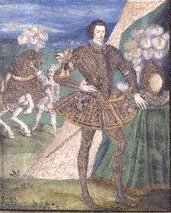
[Read the whole of the 'Orion' scene here.]
My candidate for Orion is Robert, Earl of Essex (1566 - 1601). |
| Vertumnus trillingly summons this character as 'Orion, Vrion, Arion'. | We know about Orion the hunter, but who are 'Urion' and 'Arion'? I suggest 'Urion' is 'Urien', the Welsh warrior king who appears in Arthurian legends: Essex had close ties with Wales, being of Welsh descent and with estates on the Welsh borders. 'Arion' was a famous Greek poet: Essex too at this point was making his mark as a courtier-poet. |
| Orion enters a 'like a hunter'. | Why should Essex be a 'hunter'? Because, according to Sim, "Today we may not associate hunting with war but during the Tudor period the two went together in most people's minds. Sir Thomas Elyot in his Book Named the Governor talks at some length on the subject. Well-bred young boys should be skilled in hunting because it 'increaseth in them both agility and quickness, also sleight and policy to find such passages and straits, where they may prevent or entrap their enemies. Also by continuance therein they shall easily sustain travail in wars, hunger and thirst, cold and heat.' " (Sim) So for huntsman, think warrior. |
| Orion is at first haughtily angry at being called from his 'sport' by the gopher Vertumnus: "Sirra, wast thou that cal'd vs from our game? How durst thou (being but a pettie God) Disturbe me in the entrance of my sports?" but when he learns the call comes from his liege lord Summer, he is all gracious compliance: "Tis I, dread lord, that humbly will obey." |
Having reluctantly given Essex charge of the Rouen force Elizabeth, distrusting his inexperience, sent him out accompanied by three older men: Sir Henry Unton, Sir Thomas Leighton and Henry Killigrew. Unton's instructions warned that he was not to shirk transmitting her criticisms to the Earl, though she didn't explain how he should do this tactfully. It's reasonable to suppose Essex resented his trio of advisers. One of Killigrew's more aghast letters records Essex's passionate response to Elizabeth's recall order, which 'put his honour in suche an extreme agony and passion that he sownded often and did so swell that, castying hem selfe upon his bed, all his bottons of his doblett brak away as thoth they had ben cut with a kneffe'. Phew, who'd be an intermediary... Nevertheless, Essex ultimately obeyed and made two brief returns to court in late 1591, successfully persuading the Queen to send reinforcements. (Hammer, p.106) |
| Summer remarks: "As I remember, thou wert Hireus sonne |
Orion the 'huntsman' is the son of a 'huntsman' whom God has now advanced to the heavens. Essex's father had died after leading a military expedition in Ireland. Whether the Irish thought he went to heaven is doubtful, but the point is, he was a soldier too and he is dead. |
| The two most nervous people on stage, Vertumnus and Autumn, both seem frightened of Orion's dogs. Timid Autumn is particularly worried by them and calls them "venome-breathed curres" and "foule-mouthed mangy dogs". They have a malicious disposition and they "arre and barke at night against the Moone/For fetching in fresh tides to cleanse the streetes." |
Autumn's complaints are not against the dogs' bite but their bark, and most of all their evil breath. It is by 'vomiting flames' that Orion's dogs do such harm. In a Cambridge play written at the end of the decade, association is made between dogs and the hand-to-mouth writers Ingenioso and Furor Poeticus - lightly-disguised portraits of Nashe and his later follower Marston. They too are accused of barking against the moon, i.e. criticising the Queen. I think Orion's 'dogs' are the writers who looked hopefully to him, his military friends and followers (as Nashe did to Sir Robert Carey and Sir Roger Williams). Not so much a faction perhaps, more an entourage. |
| Orion's speech in praise of dogs is, according to McKerrow, largely taken from an English paraphrase of a work by Sextus Empiricus. In this paraphrase, but not the classical original, is a short inserted passage Nashe makes into lines 692-7 of SLW: "Yea, there be of them, as there be of men, |
This insert comes immediately after a line, which is in Sextus, praising dogs for hunting and catching rabbits: or as the translator puts it 'Hunting and conie-catching, two fine artes.' Coney-catching of course had the meaning of 'trickery' to Elizabethans - as did 'fetching' and 'sheep-biting'. The OED gives 'dive' the meaning of picking pockets, but the earliest example it quotes is 1700. 'Turnspit' has a slightly pejorative meaning in the other place Nashe uses it (HWYTSW, 'turn-broach') and McKerrow glosses it as 'scullion-like'. To me though it sounds as if the 'dogs' are being praised for having rather edgy, disreputable skills. I think the reference is still to two-legged dogs: to men like Watson, Greene, Marlowe and Nashe himself, scholars and wits sometimes forced to earn their bread by less than respectable means, and looking more hopefully to the young freespending earl than to the old Queen and her councillors. |